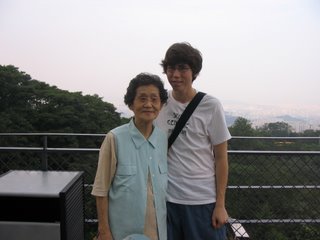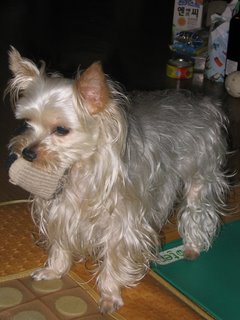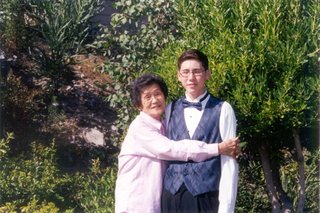She looks like my grandmother.
Her white hair is permed. Her feet dangle a few inches aboves the ground when she sets her walker aside and sits down. Her smile--dentures and all--is beautiful.
They introduce me as "our American friend who speaks really good Korean." She smiles and nods.
We tour the home, walking upstairs, onto the balcony, then down to the gardens and rice fields. The heat is awful today and we end our tour sprawled out on the
pyung san, a large platform raised about a foot above ground.
We go back in for lunch,
noraebang(Korean karoke), and an exercise class that consists mainly of stretching and throwing a ball around the circle.
These gray-haired ladies are too shy to sing to prompts on the television screen, but they have a good time with the streches and games.
At four, we pack up, say our goodbyes to the
hal muh nis(literally: grandmother, but it's a term used for any elderly woman), and hop into the van for the hour-and-a-half drive back to Seoul.
I wasn't at a nursing home. I was at a shelter for elderly former prostitutes in the outskirts of Seoul.
These women endure unbelievable social prejudice and stigma on every level. The Korean government--in official documents--has labeled prostitutes as a "possible class to abandon," casting them as criminals and providing them with minimal services. Hitting closer to home in this Neo-Confucian society, even the children many of these women sold their bodies to provide for abandon their mothers.
It's not too hard to let snide comments about whores slip through your lips. I've heard them too many times. I've seen the sterotypes paraded on stage in Korean musicals. I've read books like Belle DuJour's
Intimate Adventures of a London Call Girl that glamourize sex work.
None of them get reality right. For
most prostitutes, this life is one ridden with lonliness and alienation--not platinum blond wigs or
major publishing deals.That's why I cringe so often these days at the stereotypes of prostitutes so remarkably similar around the world whether in Steinback's
East of Eden or in Korea's longest-running musical,
Subway Line 1. Our popular culture paints the prostitute as a young, horny--and don't forget dumb--vixen parading her scantily-clad body on the city streets. But, here's the reality for you. What prostitutes around the world share is not beauty or personality traits, it's poverty. You can call for the legalization of sex work all you want, but I'll bet you won't see the daughters of middle-class lawyers joining the ranks of prostitutes if that day comes. Poverty--often coupled with the need to provide for children--is what draws women to prostitution. And here's another reality for you: prostitutes don't stay young forever and they don't have benefits or security when they're past their prime. The ones I met a few weeks ago are the very lucky.
Somehow, I think we'd hear a lot fewer jokes, see a lot fewer glamorous depictions if those who made them just had one chance to see what these women look like years down the line--not to different from their own grandmothers.








